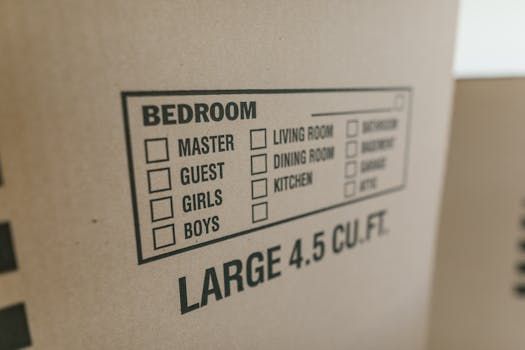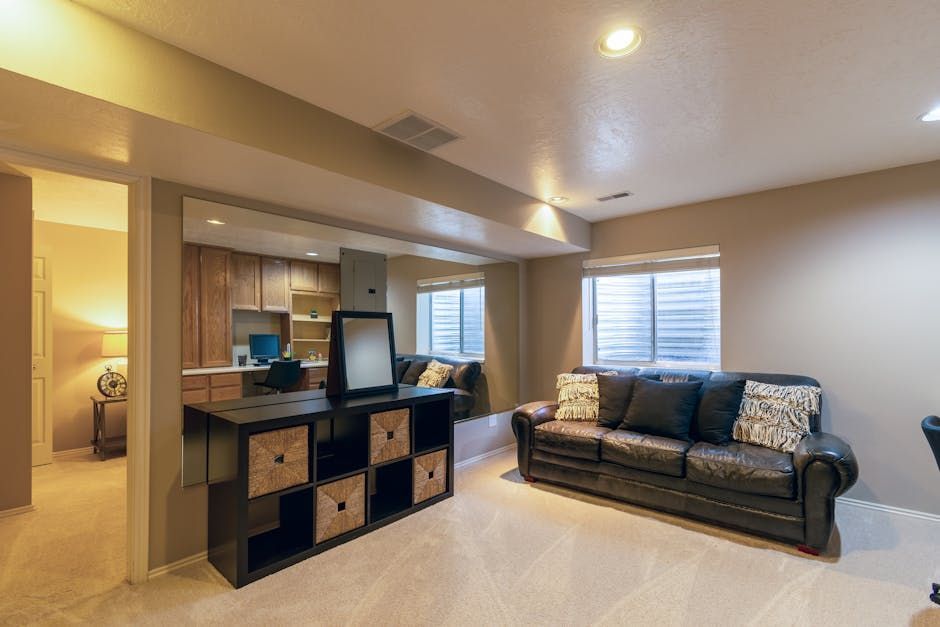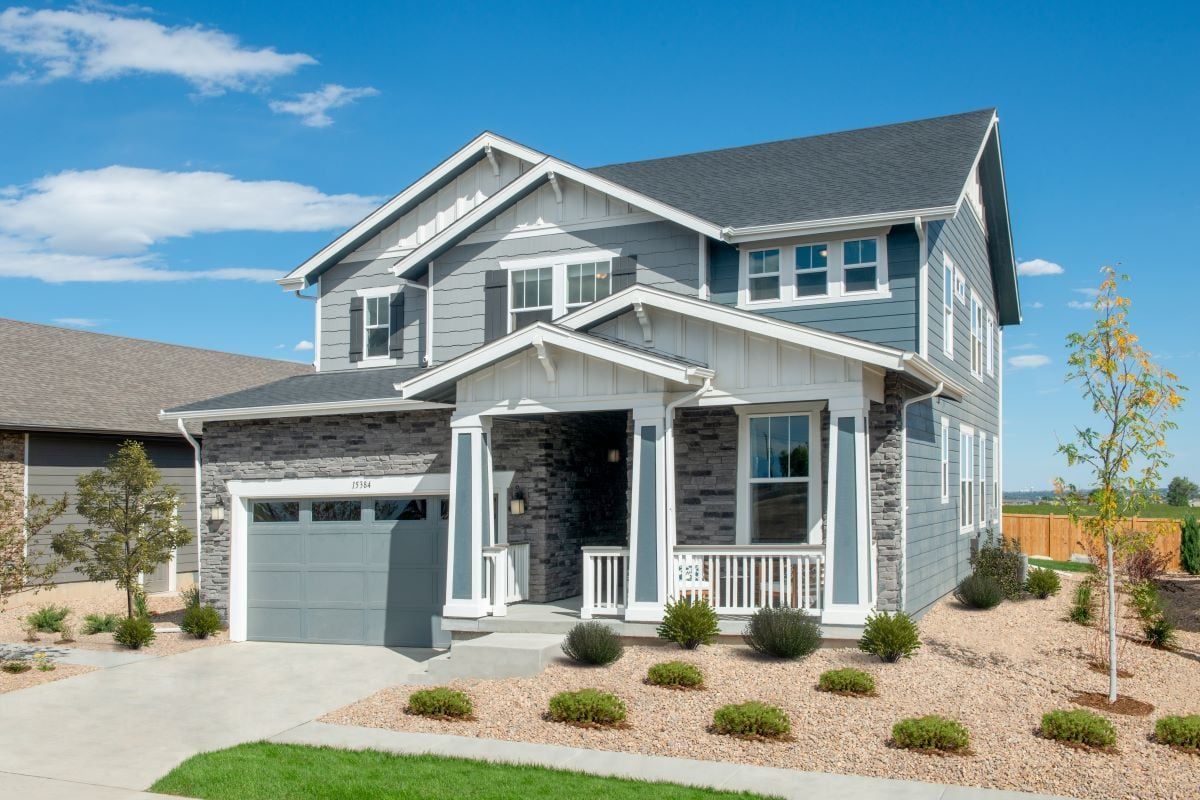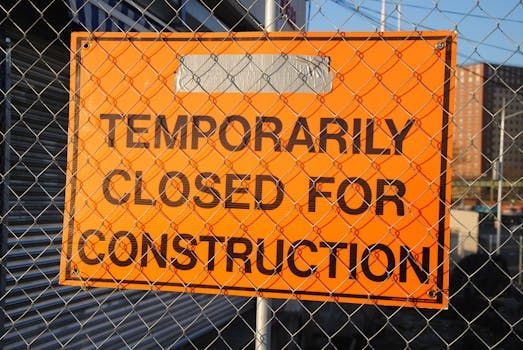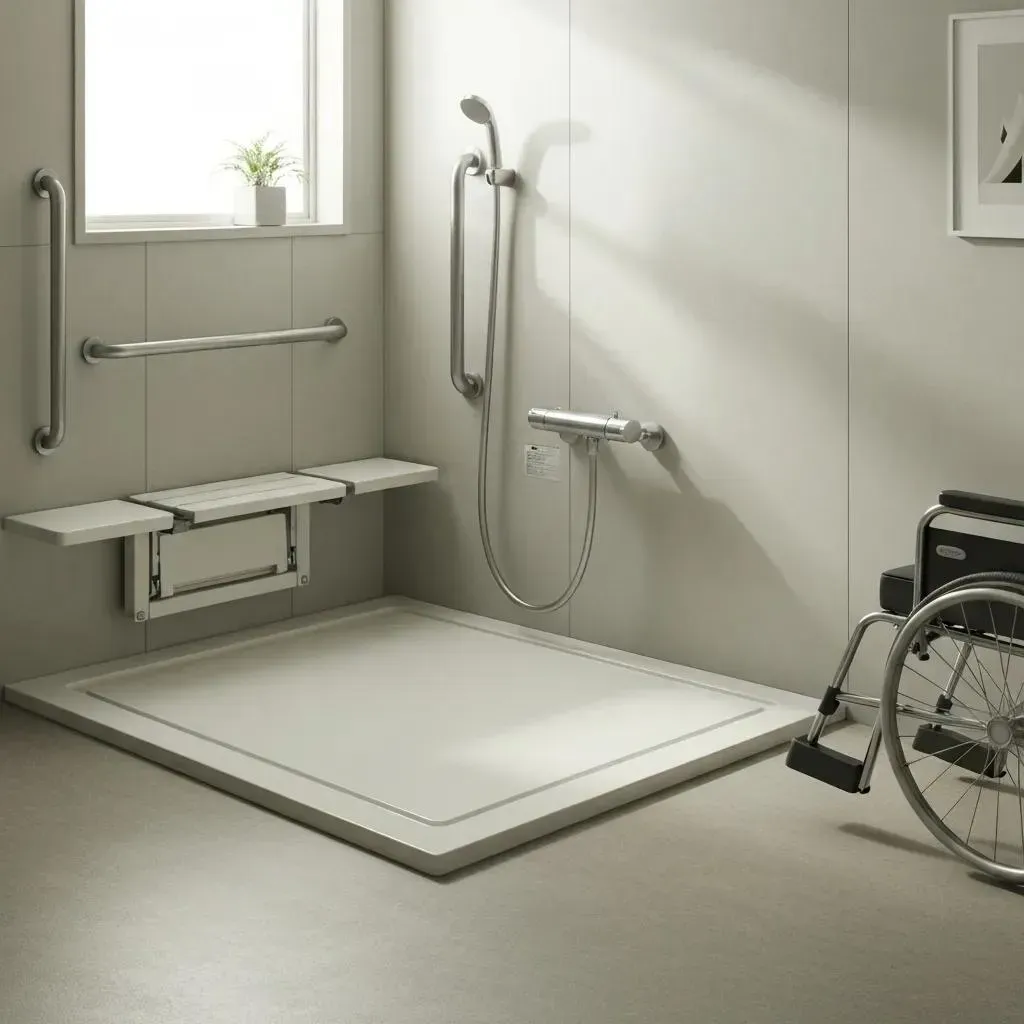Local Heroes for Small Home Repairs – Find Contractors Nearby
Finding Reliable Home Repair Help When You Need It Most
Looking for small home repair contractors near me? Here's how to quickly find trusted local professionals:
- Check online directories - HomeAdvisor, Angi, or BBB
- Search by zip code - Most platforms allow filtering by distance
- Read verified reviews - Look for 4+ star ratings
- Verify credentials - Ensure they're licensed and insured
- Get multiple quotes - Compare at least 3 estimates
When something breaks in your home, finding reliable help quickly becomes a top priority. Small home repair contractors near me searches spike during seasonal transitions and after extreme weather events in the Denver area. These professionals—sometimes called handymen—handle tasks from minor carpentry and plumbing fixes to drywall repair and safety installations, typically charging between $40-$140 per hour.
Unlike major renovation contractors, small repair pros specialize in quick-turn projects that don't require extensive permits or structural changes. They bridge the gap between DIY attempts and specialized tradespeople, offering a balance of affordability and professional expertise.
I'm Mike Martinez, owner of Accountable Home Remodeling, with over 20 years of experience connecting Denver homeowners with trusted small home repair contractors near me who deliver quality craftsmanship and transparent communication on every project.
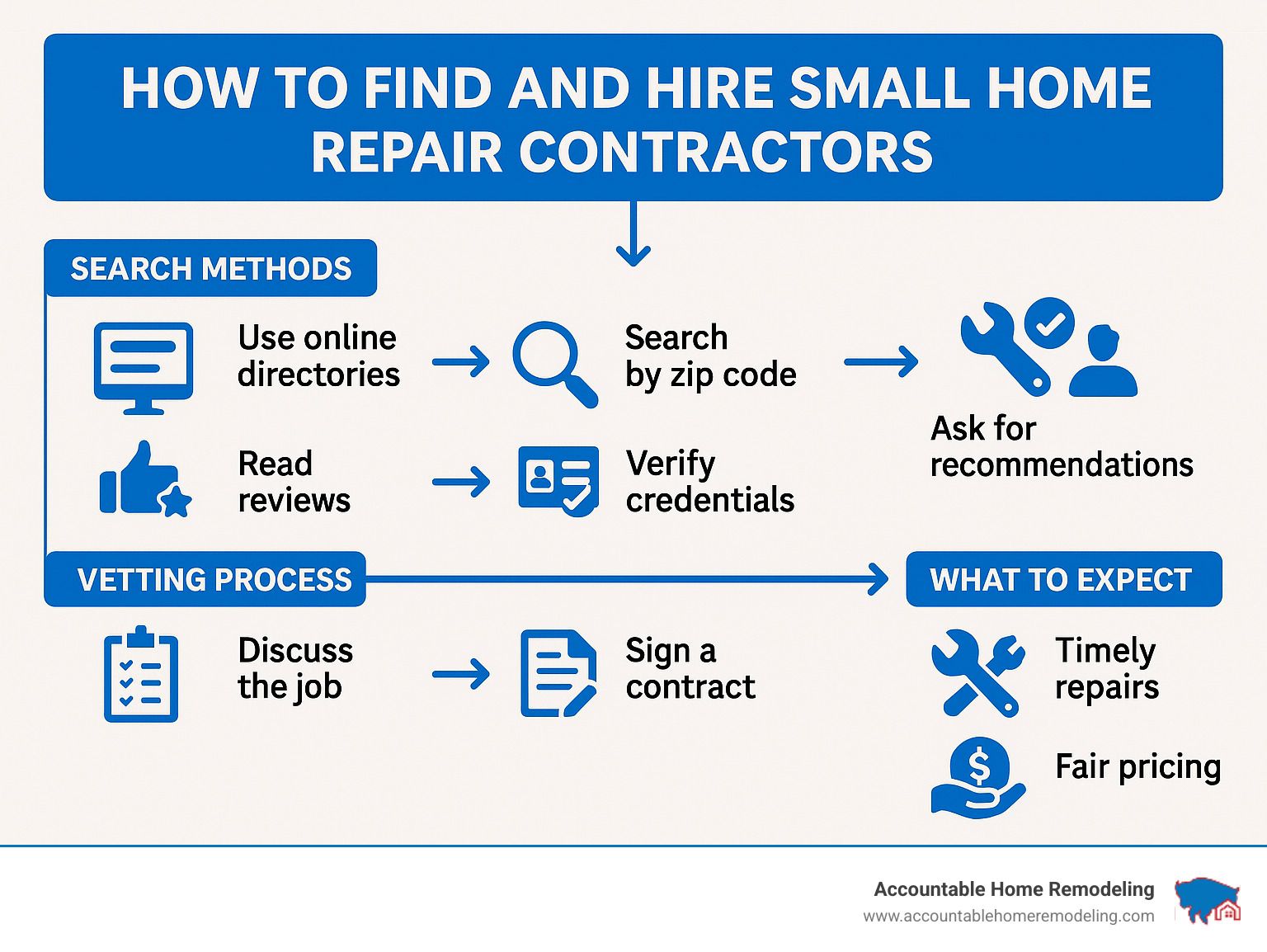
1. What Does a Small Home Repair Contractor Do?
Ever wonder who to call when your home needs those "not-quite-emergency-but-definitely-annoying" fixes? Small home repair contractors are the Swiss Army knives of home maintenance—versatile professionals who tackle a variety of issues without the need for major renovation crews.
These handy pros excel at solving multiple problems in a single visit, bringing order back to your home with efficiency and skill. They're the middle ground between DIY attempts and hiring specialized tradespeople for every little thing.
A typical small home repair contractor near me can handle an impressive range of tasks. They're skilled at minor carpentry work like fixing wobbly deck boards or repairing that kitchen cabinet door that won't close properly. Need light plumbing help with a dripping faucet or clogged drain? They've got you covered. Those basic electrical issues like installing ceiling fans or replacing outdated light fixtures are right in their wheelhouse too.
When it comes to drywall repair, these professionals can patch holes, fix unsightly cracks, and match textures so well you'll forget where the damage was. They're also experts at door and window work, eliminating annoying squeaks or drafts that drive you crazy during Denver's cold winters.
"I was amazed when the contractor from Accountable fixed my sticking bathroom door, replaced a broken outlet, and patched a hole in my hallway wall—all in one afternoon!" shares Jennifer from Lakewood. "He even had time to install a grab bar in my mother's shower for extra safety."
Speaking of safety, these contractors are invaluable for safety and mobility installations like adding railings or grab bars to help family members with mobility challenges steer your home more confidently. Learn more about our comprehensive service offerings that can transform your space.
Handyman vs Contractor vs Specialist
Confused about who to call? Understanding the differences between these three types of professionals helps you make the right choice for your specific needs:
A handyman typically handles smaller, non-permitted jobs working solo or with minimal help. They usually charge hourly rates ($40-$140) and are perfect for quick fixes and minor repairs that don't require permits or specialized licensing.
A general contractor manages larger projects requiring permits and coordinates multiple subcontractors. They typically charge by the project rather than hourly and are best suited for remodels, additions, or structural work that changes your home's footprint or systems.
A specialist or tradesperson focuses exclusively on one area—like a master plumber or licensed electrician. They charge premium rates for their specialized knowledge and are essential for complex system issues or code-critical work where expertise in a single area is paramount.
The right choice often depends on the scope and complexity of your project. Dave from Arvada learned this firsthand: "I initially called an electrician for a simple light fixture replacement who quoted a $175 minimum. My local repair contractor did the same job for $80 and also fixed a sticky door while he was there!"
When considering small home repair contractors near me, think about the project's size, permit requirements, the depth of skill needed, and your timeline. For those everyday fixes that improve your home's function and feel without breaking the bank, a small repair contractor offers the perfect balance of versatility, skill, and value.
2. Do You Need DIY, a Handyman, or a Pro Contractor?
That dripping faucet or squeaky door might seem like an easy weekend project, but before you grab your toolbox, take a moment to honestly assess whether you should DIY or call for backup.
DIY projects can be rewarding when you have the skills and tools already on hand. That bathroom shelf installation might be perfect for your beginner skills if you've got a drill and level ready to go. The satisfaction of completing a repair yourself—plus the money saved—can make DIY worthwhile for simple tasks.
However, our team at Accountable Home Remodeling has seen countless "simple" DIY attempts turn into expensive fixes. In fact, homeowners who dive into complex projects often end up spending 30-40% more when they eventually call us to correct mistakes. As one Thornton homeowner confessed with a laugh: "I tried to replace a toilet myself. After three trips to the hardware store and a minor flood, I called a pro who completed it in 30 minutes."
When your project involves electrical work, structural changes, or requires permits, it's time to consider professional help. Small home repair contractors near me searches spike for good reason—some jobs simply need experienced hands.
The decision often comes down to weighing risk against reward. That ceiling fan installation might save you $150 if you do it yourself, but is it worth the potential hazards of incorrect wiring? Probably not. Similarly, code compliance issues can affect your home's value and even insurance coverage.
Benefits of Hiring a Pro
When Mark from Aurora called us about his ceiling fan disaster, his story was all too familiar: "After watching three YouTube videos, I thought replacing a ceiling fan would be easy. Two hours later, I had a mess of wires and parts. The contractor fixed everything in 45 minutes and even noticed a potential fire hazard in my old wiring that I would have missed completely."
This highlights the true value professionals bring—experience that prevents problems before they happen. When you hire a qualified contractor, you're not just paying for the repair itself but for years of problem-solving expertise.
Time savings is another major benefit. What might consume your entire weekend can often be completed by a professional in just hours. For busy Denver families, this time reclaimed for things you actually enjoy can be priceless.
Warranty protection offers peace of mind that DIY simply can't match. Most reputable contractors guarantee their work for a specified period (typically one year), meaning if something goes wrong, you're covered.
The right tools make all the difference too. Professional contractors arrive with specialized equipment that most homeowners don't have—or want to purchase for a one-time use. This proper equipment ensures the job gets done correctly the first time.
Finally, there's the matter of injury prevention. We've seen too many homeowners in emergency rooms after ladder falls or cuts from power tools. Professional contractors are trained in safety protocols that protect both themselves and your property.
The bottom line? Simple, low-risk projects can be great DIY opportunities. But when safety, significant home systems, or structural elements are involved, investing in a professional often saves money, time, and stress in the long run.
3. How to Search for small home repair contractors near me
When your faucet starts leaking or that deck railing becomes wobbly, finding reliable help quickly becomes a priority. Searching for small home repair contractors near me doesn't have to be stressful—there are plenty of effective ways to connect with qualified professionals in your neighborhood.
Online Tools for Finding small home repair contractors near me
The digital world offers several streamlined options for connecting with local repair pros. I've found that starting with a focused search approach saves time and frustration.
The Better Business Bureau (BBB) remains one of the most trusted resources. You can search for "general contractors" or "handyman services" and narrow results by distance—whether that's 5 miles for someone who can arrive quickly or up to 50 miles if you're willing to wait for the perfect pro. Their A+ to F rating system helps you quickly identify reputable businesses with solid track records.
Many Denver homeowners I work with have had great success with Angi (formerly Angie's List). After entering your ZIP code and basic project details, you'll be matched with up to three pre-screened professionals. What makes Angi valuable is their verified review system—you're seeing feedback from actual local homeowners who've hired these contractors.
HomeAdvisor takes screening seriously, conducting background checks, license verification, and identity confirmation before contractors can join their platform. Their pros must maintain at least a 3-star rating to stay listed, which helps maintain quality standards.
For a quick visual overview of options, a simple Google Maps search for "small home repair contractors near me" shows nearby businesses complete with ratings, hours, and contact details. I often recommend scrolling through recent reviews to get a feel for a contractor's reliability and quality of work.
Don't overlook Nextdoor—this neighborhood-specific platform often features recommendations from people living just blocks away who have experience with local contractors. As one Lakewood homeowner told me, "The contractor I found through Nextdoor had worked on three houses in my neighborhood. I could actually walk over and see his work before hiring him!"
When browsing these platforms, pay attention to how companies respond to negative reviews—their problem-solving approach tells you volumes about how they'll handle any issues that might arise during your project.
Local Networks to Meet small home repair contractors near me
While online tools are convenient, sometimes the old-fashioned approach yields the best results. Your local community often holds hidden gems when it comes to finding skilled repair professionals.
Next time you're picking up supplies at your neighborhood hardware store, take a moment to check their community bulletin board. Local contractors frequently post business cards, and store employees can sometimes offer recommendations based on which pros they see purchasing quality materials regularly.
Many neighborhood associations and HOAs maintain lists of approved service providers who've already worked successfully in your community. These contractors are familiar with the specific requirements and common issues in your area's homes.
The power of word of mouth remains best. A quick conversation with neighbors, especially those who've recently had work done, can lead to finding contractors who are already familiar with homes like yours. As one Boulder resident shared with me: "After getting three quotes from online services, I happened to ask my neighbor who had fixed her deck. She recommended a local contractor who charged less than the others and did exceptional work. Now I always ask neighbors first."
Facebook groups focused on your specific neighborhood can be goldmines for contractor recommendations. Posts asking "Who's the best handyman in Washington Park?" often generate dozens of responses with detailed experiences and contact information.

By combining these online and community-based approaches, you'll develop a solid list of potential small home repair contractors near me to contact for estimates. The key is to start your search before you have an emergency—having a vetted contractor already in your contacts can save significant stress when unexpected repairs pop up.
4. Vetting: Licenses, Insurance & Reviews
Finding a contractor is just the first step—now comes the crucial part of making sure they're legitimate and reliable. Taking time to properly vet your potential contractors can save you from headaches, poor workmanship, and even legal issues down the road.
Licensing and Insurance Verification
In Colorado, proper credentials matter. State licensing is required for general contractors performing certain types of work. Don't just take their word for it—verify their license status through the Colorado Department of Regulatory Agencies. Many Denver-area municipalities also have additional licensing requirements at the local level, so it's worth checking with your city's building department as well.
Insurance coverage is non-negotiable. Quality contractors should carry both liability insurance (protecting your property if something goes wrong) and workers' compensation (covering their employees in case of injury). Ask to see certificates and check that they're current—a reputable contractor won't hesitate to provide this documentation.
"When I asked about insurance, the contractor not only showed me his certificates but explained exactly what they covered," shares one Lakewood homeowner. "That level of transparency told me a lot about how he runs his business."
It's worth noting that HomeAdvisor's screening process disqualifies contractors with felony convictions within the past seven years or certain sex-related offenses at any time. However, these background checks typically only cover the owner or principal—not every employee who might work in your home.
Review Analysis
Stars aren't everything when it comes to reviews. Look beyond the ratings to the actual comments, which often reveal the true nature of the customer experience. Were problems resolved? How was communication handled? Did the project stay on budget?
Check multiple platforms for a complete picture—a contractor might have glowing reviews on one site but complaints on another. Pay attention to how contractors respond to criticism. Do they acknowledge issues and offer solutions, or get defensive and make excuses?
Be wary of perfection. Ironically, a business with nothing but 5-star ratings might be less trustworthy than one with a mix of mostly positive reviews and a few constructive criticisms. As one Broomfield homeowner noted: "The contractor I hired had a 4.7-star average rather than 5 stars, which actually made me trust the reviews more. The few 4-star reviews mentioned minor communication issues but praised the quality of work, which matched my experience exactly."
Red Flags to Avoid
When vetting small home repair contractors near me, watch for these warning signs that should send you running:
No written estimates is a major red flag. Professional contractors always provide detailed written quotes before starting work. Similarly, cash-only payment demands often indicate someone trying to avoid taxes or proper business practices.
Be cautious of pressure tactics—quality contractors understand you need time to make decisions and won't push "today-only" discounts. And scrutinize any contracts carefully—vague agreements without specifics about materials, timeline, and payment terms spell trouble.
Legitimate businesses have physical addresses you can verify, not just P.O. boxes or mobile numbers. They should also readily provide references from previous clients. And remember, unusually low bids almost always lead to cut corners or surprise charges later.
"A contractor offered to repair my roof for half what others quoted," shared a Longmont resident. "He demanded 80% upfront in cash, which raised red flags. I declined and later heard from a neighbor that he had abandoned their project halfway through."
At Accountable Home Remodeling, we've built our reputation on transparency and trust. We encourage potential clients to thoroughly check our credentials and references, because we know that proper vetting leads to confident decisions and successful projects. For more information about our approach and guarantees, visit our FAQs page.
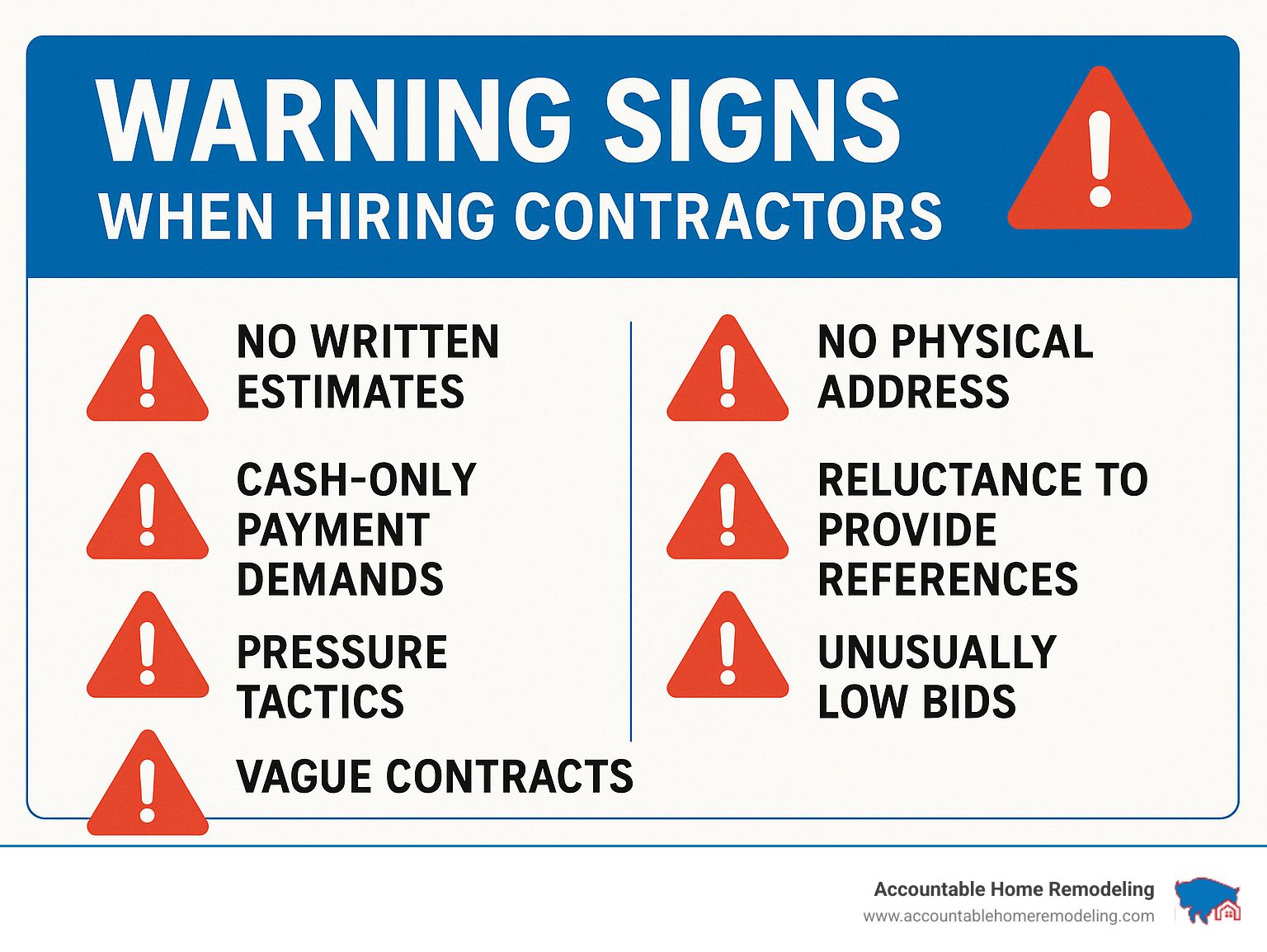
5. Typical Costs & Payment Practices
Understanding pricing structures helps you budget appropriately and recognize fair rates for small home repairs.
Standard Pricing Models
- Hourly rates: Most small home repair contractors charge between $40 and $140 per hour, with the Denver metro average around $75-90 per hour.
- Minimum service fees: Many contractors have a minimum charge (typically 1-2 hours) regardless of how small the job is.
- Project-based pricing: For defined tasks, contractors might offer flat rates based on average completion times.
- Trip charges: Some contractors add a fee for travel to your location, particularly for distant suburbs.
- Materials markup: Expect a 15-20% markup on materials the contractor purchases, which covers their time sourcing and transporting supplies.
The average total cost for small home repair projects typically falls between $180 and $700, depending on complexity and materials required.
Tipping Etiquette
Unlike service industry workers, contractors generally set their own rates and don't expect tips. However, tipping is a personal decision and appropriate in certain circumstances:
- For exceptional service or going above and beyond
- When contractors work in difficult conditions
- If they complete work under tight deadlines
When tipping is warranted, $10-$20 per person per day or 10-15% of the total bill for smaller jobs is customary. Alternatively, providing lunch, snacks, or beverages during longer jobs is always appreciated.
Handling Estimates, Contracts & Change Orders
Professional contractors follow established business practices:
Estimates should include:
- Detailed description of work to be performed
- Materials to be used (brands, grades, quantities)
- Timeline for completion
- Payment schedule
- Warranty information
Contracts should specify:
- Start and completion dates
- Change order procedures
- Cleanup responsibilities
- Permit acquisition (if needed)
- Provisions for unforeseen circumstances
Standard payment structures:
- Small jobs (under $500): Payment upon completion
- Medium jobs ($500-$2,000): 50% deposit, 50% upon completion
- Larger jobs: Progressive payments tied to project milestones
As one Westminster homeowner advised: "Get everything in writing, especially when the contractor finds additional issues mid-project. My contractor found water damage behind my shower tile and immediately provided a written change order with photos and a separate cost estimate before proceeding."
6. Pre-Visit Prep & Post-Job Satisfaction
Getting your home ready before a contractor arrives isn't just good manners—it's smart strategy that saves time and money. A little preparation goes a long way toward ensuring your repair experience runs smoothly from start to finish.
Before the Contractor Arrives
When you've scheduled a visit from one of the small home repair contractors near me, take some time to prepare your space. Clear the work area by removing furniture, decorations, and personal items that might get in the way. Your contractor will appreciate the thoughtfulness, and you'll protect your belongings from dust and potential damage.
If you have pets, plan to keep them secured in another room or arrange for them to be elsewhere during the work. Even the friendliest pets can become stressed with strangers and tools in their territory—plus, an open door during repairs can lead to escaped furry friends!
"I created a detailed list with photos of each repair needed and emailed it to my contractor before the visit," shares a client from Northglenn. "This allowed him to bring all the right materials and tools, making the repair process much more efficient."
Don't forget to discuss access needs upfront. Will you be home during the repairs, or do you need to arrange entry via a lockbox or garage code? Having this conversation beforehand prevents last-minute scrambling or scheduling conflicts.
Before your contractor arrives, prepare any questions you have about timeline, materials, or process. Also, clarify your preferred communication method—whether you want text updates, phone calls, or emails about decisions or issues that arise during the project.
After the Work is Completed
Once your small home repair contractors near me finish their work, don't rush them out the door. Take time for a thorough inspection while they're still present. Check all completed repairs carefully, test functionality (turn faucets, open and close doors, flip switches), and review the cleanup job.
Request any relevant documentation, such as receipts, warranty information, and care instructions for new installations. These papers might seem unimportant now but can be invaluable if you need service later or when selling your home.
Don't hesitate to provide honest feedback—both positive and constructive. Most reputable professionals genuinely want to ensure your satisfaction and will address any concerns on the spot. If you're pleased with their work, consider leaving an online review to help other homeowners find quality service.
If you find issues after the contractor leaves, contact them promptly. Professional small home repair contractors near me stand behind their work and will typically return to make things right.
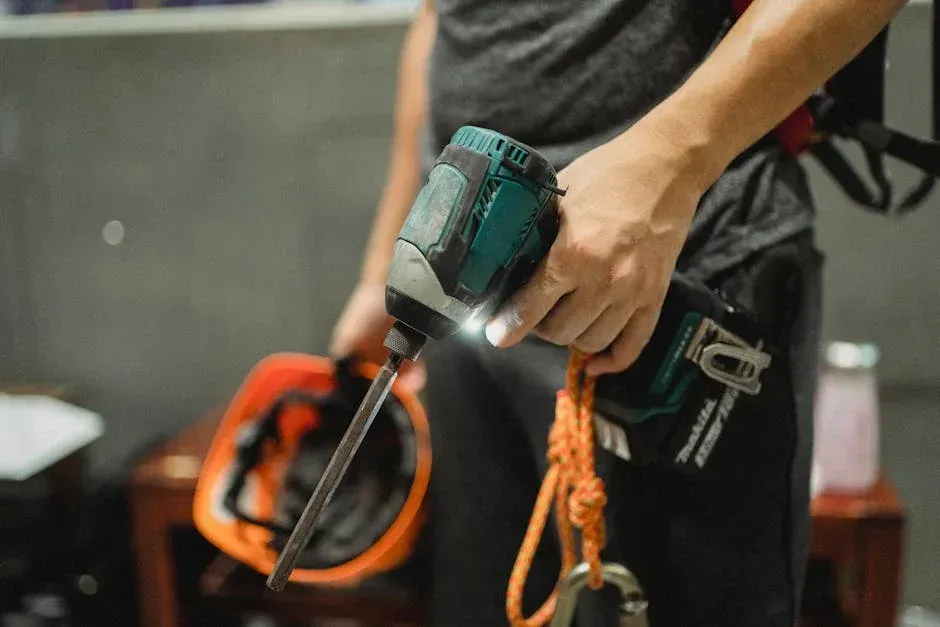
DIY-Friendly Tasks to Do First
Some simple preparation can maximize your contractor's time (and your budget). Consider handling these basic tasks before professional help arrives:
Basic cleaning of the repair area removes dust and grime that might interfere with repairs. Simple painting touch-ups for minor scuffs save your contractor from doing cosmetic work when they could be focusing on technical repairs. Changing filters in HVAC or water systems can improve functionality and provide better access to components needing repair.
You might also check for loose hardware on fixtures or handles and tighten them with a screwdriver. For bathroom or kitchen repairs, removing old caulking around sinks or tubs can be a time-saver.
As one Denver homeowner finded: "Before the contractor came to install new bathroom fixtures, I removed the old caulk around my sink and bathtub. He mentioned that this prep work saved him at least 30 minutes, which he used to fix an additional leaky faucet at no extra charge."
These small efforts not only make your contractor's job easier but might allow them to accomplish more within your scheduled time—potentially saving you money and giving you more value from your service call.
7. Special Resources & Programs
Various assistance programs exist to help homeowners—particularly seniors, veterans, and low-income families—afford necessary home repairs.
Government Assistance Programs
- USDA Single Family Housing Repair Loans & Grants: For very-low-income homeowners to repair, improve, or modernize homes or remove health and safety hazards.
- HUD Community Development Block Grants: Distributed through local governments for community improvement, including home repair assistance for qualifying residents.
- Weatherization Assistance Program: Helps low-income families reduce energy costs through home energy efficiency improvements.
- VA Specially Adapted Housing Grants: For veterans with service-connected disabilities to modify homes to accommodate their needs.
Non-Profit Organizations
Several non-profit organizations in the Denver metro area offer assistance:
- Rebuilding Together Denver: Provides free home repairs for low-income homeowners, particularly seniors, veterans, and people with disabilities.
- Habitat for Humanity's Home Repair Program: Offers affordable home repairs to keep families in safe, decent homes.
- Brothers Redevelopment: Provides a variety of housing-related services, including their "Home Modification and Repair Program" for seniors and disabled individuals.
One Aurora senior citizen shared: "After my husband passed away, I couldn't afford to fix our leaking roof. Through Brothers Redevelopment, I received assistance that covered 80% of the repair costs. The contractor they sent was respectful and did excellent work."
When Every Minute Counts—Emergency Repairs
Some home repairs can't wait for normal business hours. Emergency situations include:
- Water emergencies: Burst pipes, major leaks, or sewer backups
- Electrical failures: Complete power loss, smoking outlets, or exposed wiring
- Gas leaks: Immediately evacuate and call your gas company
- Structural damage: Compromised roof, foundation, or support structures
- Lock-outs or security issues: Broken windows or doors that compromise safety
Many small home repair contractors offer emergency services with 24/7 availability, though expect to pay premium rates (often 1.5-2x standard rates) for after-hours, weekend, or holiday service.
As one Lakewood resident recounted: "When a pipe burst at 2 AM during a February cold snap, I called three emergency plumbers. Only one answered, and he arrived within an hour. The emergency rate was double the normal hourly rate, but preventing extensive water damage was worth every penny."
Frequently Asked Questions about Hiring Small Home Repair Pros
What questions should I ask before signing?
Finding the right small home repair contractors near me starts with asking the right questions. When I first meet with potential clients, I encourage them to interview me thoroughly – it's the best way to ensure we're a good match.
Always ask if your contractor is licensed and insured for your specific type of work, and don't hesitate to request proof. Experience matters tremendously in this industry, so inquire about how long they've been handling similar projects. A contractor who's fixed dozens of leaky shower pans will likely outperform someone tackling their first water intrusion issue.
"I always tell homeowners to ask for references specific to their type of project," says Mike from Arvada, who's been in the business for 15 years. "Seeing photos of past work similar to yours gives you real confidence in their abilities."
Warranty policies vary widely among small home repair contractors near me, so get clarity on what's covered and for how long. Understanding the payment schedule is equally important – most reputable contractors won't ask for full payment upfront, but rather use a structured approach based on project milestones.
One question many homeowners forget to ask: who will actually perform the work? Sometimes the friendly, knowledgeable person giving your estimate isn't the same individual who'll be wielding the tools in your home. And always discuss how unexpected issues will be handled – the change order process should be clear before any work begins.
Set realistic timeline expectations, and don't forget to ask how they'll protect your property during repairs. Professional contractors take precautions to prevent collateral damage to surrounding areas.
Are contractors obliged to be licensed and insured?
The requirements for small home repair contractors near me vary significantly depending on your location. Denver requires contractors to be licensed for most construction work, while Boulder has particularly strict licensing requirements. Aurora, Westminster, Thornton, and Broomfield each maintain their own specific licensing standards.
Even if your city doesn't mandate licensing for minor repairs, insurance remains absolutely crucial. Your contractor should carry general liability insurance (minimum $1 million is recommended) to cover any damage to your property, plus workers' compensation to protect you from liability if someone gets injured on your property.
"I learned this lesson the hard way," shares Jamie from Arvada. "I hired an unlicensed handyman to save money on bathroom repairs. When he damaged a water line causing flooding, I found his insurance had lapsed. My homeowner's insurance refused to cover the damage since I'd hired an uninsured worker."
Always request proof of both license and insurance before work begins, and consider verifying this information with your local building department or the insurance provider directly. It might seem like an extra step, but it can save you from significant headaches down the road.
Should I tip my contractor and how much?
Unlike restaurant servers or hairstylists, small home repair contractors near me generally set their own rates and don't rely on tips for their income. That said, tipping is always appreciated when service goes above and beyond expectations.
Consider offering a tip when your contractor completes work under particularly challenging conditions (like crawling through a tight crawlspace or working during a heatwave), accommodates last-minute requests, or delivers results that exceed your expectations.
For appropriate amounts, a good rule of thumb is $10-$20 for small jobs lasting a few hours, $20-$50 for day-long projects, or 5-10% of the total bill for larger jobs. Many homeowners also show appreciation through non-monetary gestures like providing lunch during all-day jobs or cold drinks on hot days.
"Rather than a cash tip, I wrote detailed positive reviews on three platforms for my contractor," shares a client from Boulder. "He later told me those reviews brought him five new clients, which was more valuable than any tip I could have given."
In fact, positive online reviews and personal referrals are often the most valuable form of thanks you can offer. They help quality contractors build their business and stand out among the many small home repair contractors near me competing for attention online.
Conclusion
Finding reliable small home repair contractors near me is a journey that's worth taking your time with. After all, these are the people you're inviting into your home to fix the spaces where you and your family live every day.
Throughout this guide, we've walked through the essentials of connecting with qualified professionals who can tackle everything from leaky faucets to drywall repairs. The right contractor brings not just technical skills, but also reliability, transparent communication, and respect for your home and budget.
At Accountable Home Remodeling, we've spent years building relationships with the most trustworthy contractors across Broomfield, Westminster, Thornton, Northglenn, Arvada, Boulder, Denver, Longmont, Aurora, and Lakewood. These professionals share our commitment to quality craftsmanship and honest communication – values that form the foundation of every successful home project.
The contractor who offers the lowest bid rarely delivers the best long-term value. Quality workmanship might cost a bit more upfront, but it prevents expensive fixes down the road. As one of our Westminster clients put it, "I learned the hard way that saving $200 on a bathroom repair ended up costing me $2,000 six months later when the shortcuts became apparent."
When you're ready to move forward with your home repairs, take a moment to reflect on what matters most to you:
Is it speed? Some contractors can offer next-day service for urgent needs.
Is it precision? Look for specialists with experience in your specific type of repair.
Is it budget? Be upfront about your constraints – a good contractor can help prioritize repairs to match your financial situation.
Your home deserves care from people who treat it as if it were their own. Trust your instincts during the vetting process, ask plenty of questions, and don't rush the decision. The right match is out there.
Ready to connect with qualified small home repair contractors near me? Contact us today, and we'll help you find the perfect professional for your specific needs.
For larger home change projects including kitchen remodels, bathroom renovations, or whole-home makeovers, explore our full range of services at Accountable Home Remodeling. We bring the same attention to detail and customer-first approach to every project, no matter the size.

